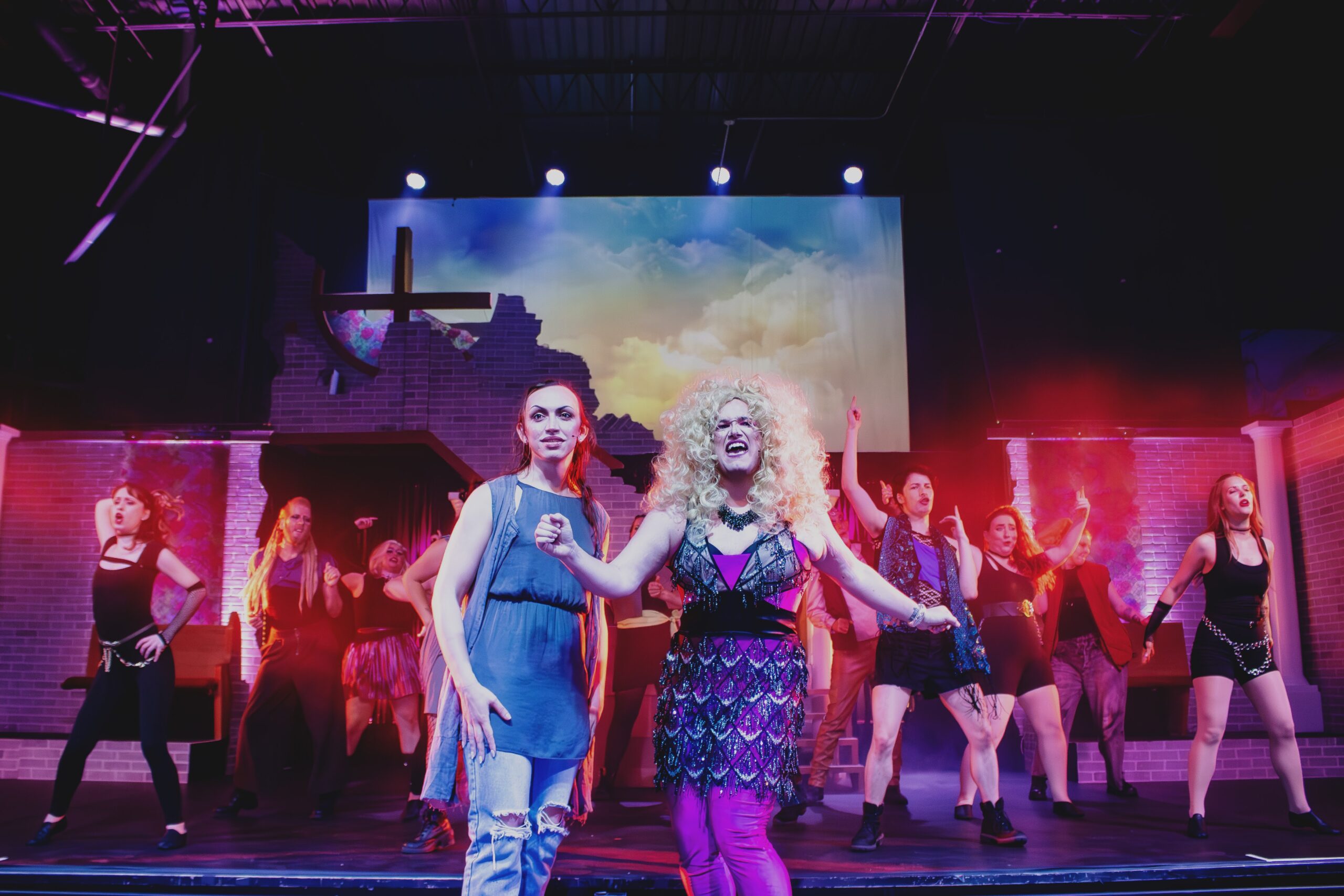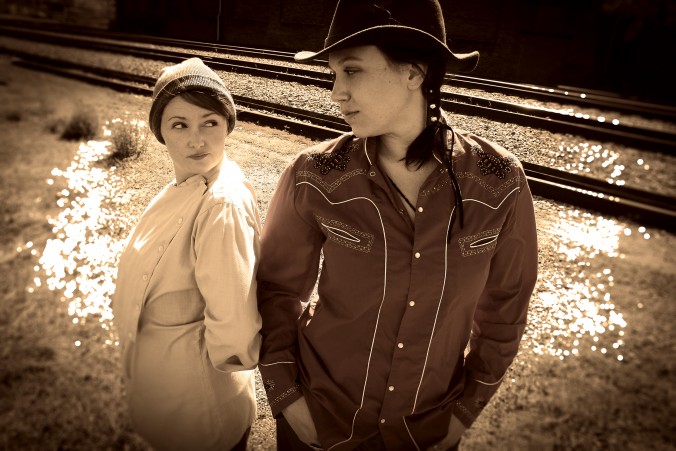2015 Young Playwrights Festival
Various writers and directors
Reviewed by Kathi E.B. Ellis
Entire contents are copyright © 2015, Kathi E.B. Ellis. All rights reserved.
This weekend saw the annual Young Playwrights Festival at Walden Theatre take the stage. In recent years the number of plays has been reduced, whether by design or by student interest, and this year’s program ran comfortably under two hours, showcasing six short scripts. Three of the playwrights had scripts in the 2014 Festival (which I did not see) and the others make their debut this year. For the past two years local playwright Diana Grisanti, whose own work is produced around the country, has taught Walden’s playwriting students.
True to past festivals there is a wide variety of themes and style. This year there are three ‘slice of life’ scripts, a satire, an issue play and one influenced by English genres. Each runs between ten and fifteen minutes in length and together they provide roles for a good cross section of Walden’s student body.
Anita Maan by Ruby Osborne, a 7th grader at Meyzeek Middle School, makes her Festival debut as a writer with a strong commentary about the pettiness and rivalry that exist in middle school. The dialogue feels like it’s drawn from overheard conversations in the school hallways. The characters are definitely ‘types’ but in general don’t descend into cliché – even the ‘female dog’, a clever running gag, is clearly drawn from observation rather than generalization. Osborne is to be commended not only for asking the tough questions about why middle-schoolers end up in cliques and dissing the outsiders, but also for not giving us pat answers. The happily-ever-after ending, as staged at least, suggests a tongue-in-cheek awareness that such endings may not be permanent.
Will DeVary marks his second Festival appearance with Days Gone By, a piece that takes on high school issues and relationships. DeVary is a freshman at Floyd Central High School. Set at a keg party, he explores the relationship between two seniors, from different schools, who haven’t seen each other in three years. The dialogue feels very naturalistic as the young woman, becoming more drunk, pushes her former friend to tell her, finally, why he dropped the friendship; his inarticulateness eventually breaks in a cascade of truth-telling that is devastating for both of them. DeVary includes a somewhat ‘high’ partygoer who ends up, apparently, sleeping through this confrontation, conveniently waking up when it’s all over. It would be interesting to see how the dynamics of the confrontation change if there is more concern as to whether or not she is truly asleep.
The third piece drawn from teen experience is Kora Duvall’s Want You Back, which strikes uncomfortably close to home. Duvall is also a middle-school student, in the 8th grade at Kammerer Middle School. What seems like an ordinary evening at a local skating rink with girls chatting about the boys they like, and a suggestion that one boy likes the popular girl who already has the popular boyfriend, quickly turns to tragedy when the popular girl’s boyfriend is involved in a drunk-driving car crash: something of which we have too much experience in recent years in Louisville. The conversation between the two girls following the incident is believable awkward and painful as the two struggle to find words to deal with the situation and their feelings. The last two scenes suggest either that the boyfriend is in a coma or has died. On Saturday evening I could not discern if this confusion is in the writing or the exigencies of staging within a festival format. Whichever is the case the sense of loss from both the girlfriend and the boy who survived is palpable.
Looks Can Be Deceiving, by Notre Dame Academy 8th grader Delaney Hildreth is clearly influenced by English tropes: the manor house, the relationships between and among those upstairs and those downstairs, the mysterious murder, etc. Which is a lot to get into what is essentially a ten-minute play. Hildreth introduces seven characters into this short play, the protagonist, her parents, and the four servants, one of whom dies in mysterious circumstances which results in the remaining three trying to figure out ‘whodunit’. It would be worth considering just hearing about the girl’s parents – since all the characters recognize that they are useless and can’t control the young girl. Stylistically it’s not clear if Hildreth is parodying these tropes or whether she is paying homage to them; defining her relationship to these well-worn literary genres would strengthen this script.
Atherton freshman Jacob Craigo-Snell makes his second Festival appearance with the most ambitious piece of the evening, The Glass Elephant; in what becomes clear is a post-apocalyptic dystopia. The minimalism of a festival format did not support his sprawling, multi-location mini epic. Craigo-Snell writes with a strong sense of the inequities between those who struggle to survive and the few who have power and money. In this short form convention he would be well served to look at trimming the early expository scenes so that we can get to the essential conflicts in the piece more efficiently as that’s where the relationships develop complexity. It would also give him more space to explore the tension that arises when a revolutionary decides to throw in his hat with the oppressors which, at the moment, is almost a throw away decision. I hope that the playwright will continue to develop this piece.
#NotAllMen brought the evening to a rollicking conclusion. It’s a sure-footed satire of gender roles by returning playwright Ruthie Dworin, who is a sophomore at Louisville Classical Academy. We join three testosterone-laden men, whose meters constantly monitor just how laden they are, at a men’s rights association meeting. Played with obvious zest by three young women, the script sends up every cliché of ‘real’ men, skewers the politically-correct vocabulary of feminism, and lands much of its humor on the unfortunate son (also played by a young woman) of the leader of the pack, who is being brainwashed by both his unseen mom and, female, teacher. Men and women, young and adult, in the audience, received the piece with much laughter. Dworin goes for the laughs with assuredness and also nails the current, very real issues of gender equity. This is the kind of writing that any of the ten-minute play festivals in town would produce in a heartbeat.
Billed as the Young Playwrights Festival, this production also gives opportunities, obviously, to Walden’s actors. The stagecraft class is billed as being collectively responsible for the technical direction of the festival. This year, Walden students also direct the plays, with mentorship from Walden artists and alumni. As gratifying as it to see young directors being nurtured, one wonders if both playwright and director would benefit from emerging playwrights being directed by experienced directors and emerging directors working on established scripts.
With three of this year’s playwrights still in middle school, I’m excited to return to future festivals to observe the development of all of these young writers, as well as the introduction of future writers.
2015 Young Playwrights Festival
February 12-14, 2015
Walden Theatre
The Nancy Niles Sexton Theatre
1123 Payne Street
Louisville, Kentucky 40204
502-589-0084
waldentheatre.org
 [box_light]Kathi E.B. Ellis is a member of the Lincoln Center and Chicago Directors’ Labs and an associate member of the Stage Directors & Choreographers Society. She has attended the LaMama Directing Symposium in Umbria, Italy, and is featured in Southern Artisty, an online registry of outstanding Southern Artists. Her directing work has been recognized with nominations for the South Florida Theatre Carbonell Award. Locally, Kathi is a member of Looking for Lilith Theatre Company, a founding principal of StageLab theatre training studio, and is part of ShoeString Productions an informal producing collective. She has written book reviews and articles for Southern Theatre, the quarterly publication of the Southeastern Theatre Conference, and was a contributing writer for JCPS’ textbook for the 11th grade Arts and Humanities survey course and for YouthArts Tapestry, a Kentucky Arts Council publication.[/box_light]
[box_light]Kathi E.B. Ellis is a member of the Lincoln Center and Chicago Directors’ Labs and an associate member of the Stage Directors & Choreographers Society. She has attended the LaMama Directing Symposium in Umbria, Italy, and is featured in Southern Artisty, an online registry of outstanding Southern Artists. Her directing work has been recognized with nominations for the South Florida Theatre Carbonell Award. Locally, Kathi is a member of Looking for Lilith Theatre Company, a founding principal of StageLab theatre training studio, and is part of ShoeString Productions an informal producing collective. She has written book reviews and articles for Southern Theatre, the quarterly publication of the Southeastern Theatre Conference, and was a contributing writer for JCPS’ textbook for the 11th grade Arts and Humanities survey course and for YouthArts Tapestry, a Kentucky Arts Council publication.[/box_light]





